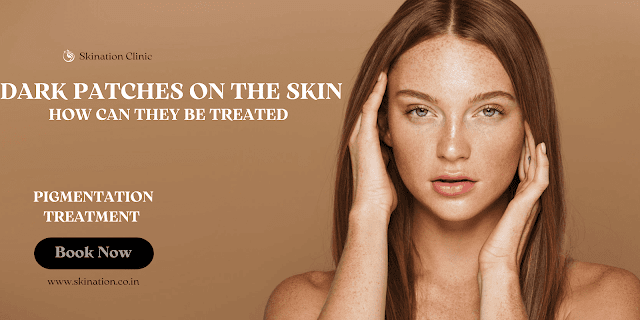Everyone dreams for clear and glowing skin. But due to factors like extreme sun-exposure, and hormonal imbalance, many face dark spots on their skin. These different shapes of dark spots on the skin are the pigmentation stubborn to go by themselves. Pigmentation spots are usually harmless. But they affect appearances which results in losing self-esteem and confidence.
In this blog, we will explore what causes dark patches on the skin and delve into various treatments and remedies to help you achieve a more even complexion. Meanwhile, reference to create this blog has been taken from skin experts of pigmentation treatment in South Delhi. Let’s start with understanding what pigmentation is.
What is Pigmentation?
Pigmentation refers to the darkening of patches of skin due to an overproduction of melanin, the pigment responsible for skin, hair, and eye colour. It can occur in various forms, including:
Melasma: Commonly known as the "pregnancy mask," melasma is triggered by hormonal changes and often affects pregnant women. It results in dark patches, typically on the face.
Sunspots (Solar Lentigines): These are caused by prolonged sun exposure and appear as flat, brownish spots on areas frequently exposed to the sun.
Post-Inflammatory Hyperpigmentation (PIH): This occurs after skin injuries or inflammation, such as acne, cuts, or burns, and can leave dark spots once the injury heals.
Age Spots (Lentigines): These are small, dark spots that often appear on areas frequently exposed to the sun, such as the face and hands, as we age.
Freckles: Freckles are hereditary and can darken with sun exposure.
After understanding the different types of pigmentation let's learn about various treatments and remedies to address these skin concerns.
Treatments for Dark Patches on the Skin
Chemical Peels: Chemical peels are a non-invasive procedure. It involves applying a solution to the top-most surface of the skin causing the top layer to peel away. This helps reduce pigmentation, revealing fresher skin beneath. Chemical peels are effective for treating various pigmentation issues, including sunspots and melasma.
Mesotherapy: Mesotherapy is an injectable procedure. In this skin revitalising treatment customised cocktail of vitamins, enzymes, and pigmentation-reducing substances is injected into the skin. It's used to target and lighten pigmentation, providing a more even skin tone.
Laser Toning: Laser toning uses controlled laser energy to break down melanin in pigmented areas, making it effective for treating pigmentation issues like freckles, sunspots, and age spots.
Cosmelan Peel: The Cosmelan Peel is a professional treatment that combines chemical peeling with depigmenting agents to reduce pigmentation. It's particularly effective for melasma and stubborn pigmentation problems.
Pink Peel Treatment: The Pink Peel is a gentle chemical peel that exfoliates the skin, reducing pigmentation and improving skin texture. It's suitable for various pigmentation concerns and leaves the skin looking refreshed and revitalised.
Derma Infusion Treatment: This treatment involves the use of a specialised device to exfoliate and infuse the skin with serums tailored to target pigmentation issues. It offers a gentle yet effective approach to pigmentation reduction.
Preventative Measures and Home Remedies
While treatments can significantly reduce the appearance of dark patches on the skin, prevention and home remedies also play a vital role in maintaining clear and even-toned skin:
Sun Protection: The most crucial step in preventing further hyperpigmentation is to protect your skin from the sun. This includes wearing sunscreen with an SPF of 30 or higher, seeking shade, and wearing protective clothing.
Topical Antioxidants: Incorporating antioxidants like vitamin C into your skincare routine can help protect the skin from free radicals and reduce the risk of hyperpigmentation.
Gentle Exfoliation: Exfoliating the skin regularly can help remove dead skin cells, allowing new, even-toned skin to surface.
Natural Remedies: Some natural remedies like aloe vera, lemon juice, and licorice extract are believed to have skin-lightening properties. However, use them with caution and consult a dermatologist, as they may not be suitable for all skin types.
Stay Hydrated: Proper hydration is essential for healthy skin. Drink plenty of water to keep your skin moisturized and supple.
Conclusion
Dark patches on the skin, or hyperpigmentation, can be a source of frustration and self-consciousness for many individuals. However, with a variety of treatment options available, ranging from topical creams to cosmetic procedures, it's possible to achieve a more even complexion. Prevention, in the form of sun protection and a good skincare routine, is also key to keeping dark patches at bay. Consulting with a dermatologist can help you determine the best approach for your specific skin type and condition, ensuring that you regain confidence in your skin's appearance.



.jpg)


